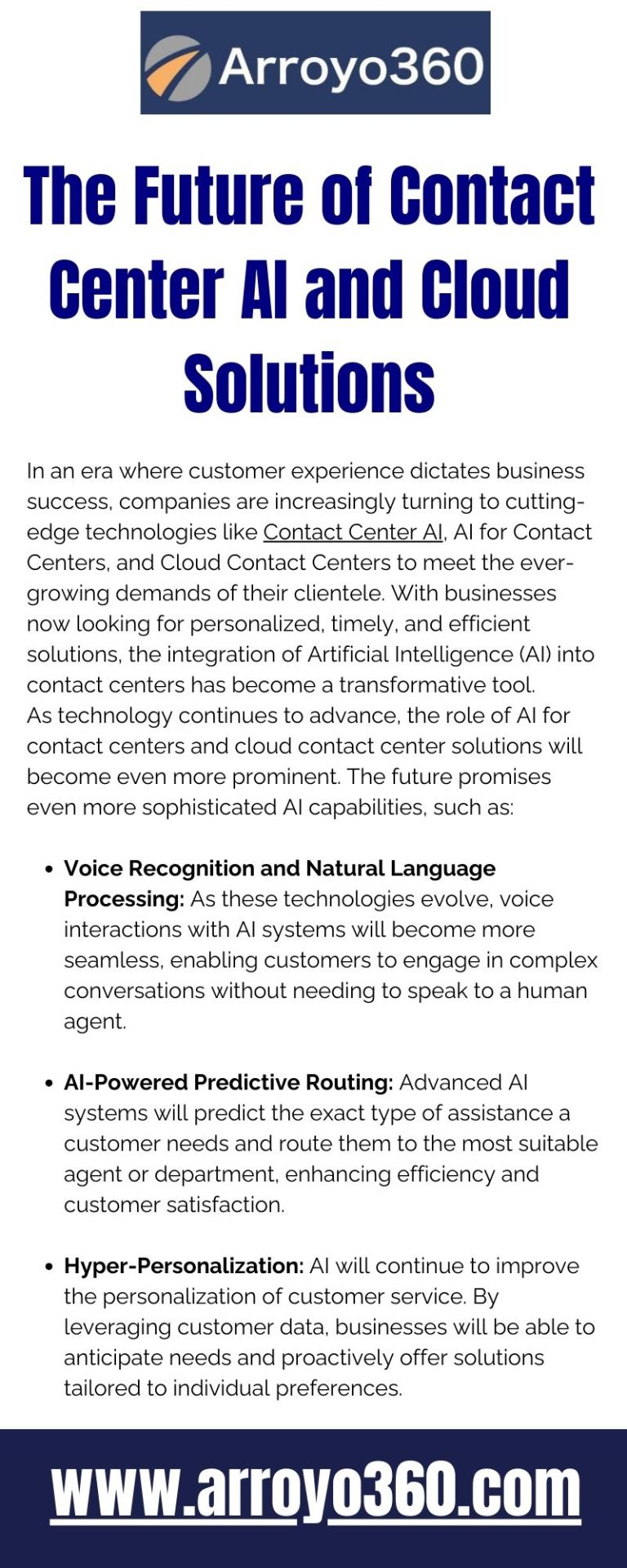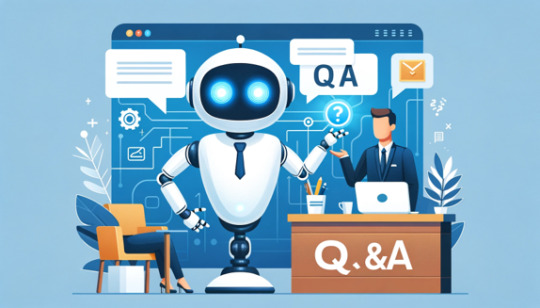#Enterprise AI Chatbot
Explore tagged Tumblr posts
Text
Why the Travel Industry Needs Enterprise AI Chatbots More Than Ever

This blog explores how enterprise AI chatbots are transforming the travel industry by providing 24/7 customer support, handling bookings, managing cancellations, and offering personalized travel recommendations making travel businesses more efficient and enhancing customer satisfaction.
0 notes
Text
The Future of Enterprise Chatbots: Beyond Conversations

The future of enterprise AI chatbots goes beyond simple conversations to become intelligent agents that handle tasks, integrate with systems, and make decisions. Powered by Agentic AI, they enable automation, personalization, and real-time business impact.
0 notes
Text
What Is Enterprise AI Chatbot Development and Why Your Business Needs It

Enterprise AI Chatbot Development helps businesses automate communication, improve customer service, and boost efficiency using AI-powered chatbots tailored for large-scale operations.
0 notes
Text
Enterprise Ai Development Company- Sparkout Tech Solutions
Sparkout Tech Solutions is a leading enterprise AI development company delivering intelligent, scalable, and secure AI solutions for modern businesses. From custom AI agents to workflow automation and LLM integration, we help enterprises accelerate innovation and transform operations through cutting-edge AI technology.

0 notes
Text
AI in Supply Chain: Revolutionizing Efficiency and Resilience
In today’s fast-paced global economy, AI in supply chain management is transforming how businesses operate, delivering unprecedented efficiency, visibility, and adaptability. As supply chains grow more complex, artificial intelligence (AI) empowers organizations to optimize processes, predict disruptions, and meet customer demands sustainably. This blog post explores AI’s role in supply chain management, its key applications, benefits, challenges, and its potential to redefine logistics.
The Power of AI in Supply Chain
AI in supply chain leverages machine learning, predictive analytics, and automation to process vast datasets, uncover patterns, and make real-time decisions. By integrating with systems like Enterprise Resource Planning (ERP) or Warehouse Management Systems (WMS), AI enhances visibility and streamlines operations across procurement, production, logistics, and customer service. Its ability to adapt to dynamic conditions makes it indispensable for navigating global trade complexities and market volatility.
Key Applications of AI
AI’s versatility drives innovation across supply chain functions:
Demand Forecasting: AI analyzes historical data, market trends, and external factors (e.g., weather, economic shifts) to predict demand accurately, minimizing overstock and stockouts.
Inventory Management: Real-time monitoring and machine learning optimize stock levels, reducing waste and improving cash flow.
Logistics Optimization: AI evaluates traffic, fuel costs, and delivery schedules to design efficient routes, cutting costs and emissions.
Supplier Management: AI assesses supplier performance and identifies risks, such as geopolitical disruptions, enabling proactive diversification.
Warehouse Automation: AI-powered robotics streamline picking, packing, and sorting, boosting throughput and reducing labor costs.
Customer Service: AI chatbots provide real-time order updates, enhancing customer satisfaction and reducing support workload.
Benefits of AI in Supply Chain
Adopting AI in supply chain offers transformative advantages:
Efficiency: Automation and process optimization lower operational costs and free resources for strategic tasks.
Accuracy: Predictive models reduce errors in forecasting and inventory, ensuring precise resource allocation.
Resilience: AI anticipates disruptions, enabling proactive mitigation to maintain continuity.
Sustainability: Optimized routes and reduced waste align with eco-friendly goals.
Insights: AI delivers actionable data, empowering informed decision-making.
Challenges to Address
Implementing AI in supply chain requires overcoming hurdles. High-quality data is critical, as incomplete or inconsistent inputs impair AI performance. Initial costs for software, hardware, and expertise can be significant, particularly for smaller businesses. Workforce training is essential to ensure effective collaboration with AI systems, and ethical concerns, such as algorithmic bias, demand transparent decision-making.
The Future of AI in Supply Chain
Advancements in machine learning, IoT, and blockchain will further enhance AI in supply chain. Digital twins for real-time simulations and AI-driven sustainability tracking are emerging trends. As AI becomes more accessible, businesses of all sizes will leverage it to build agile, resilient supply chains.
Conclusion
AI in supply chain is a catalyst for efficiency, resilience, and sustainability. By automating tasks, predicting trends, and fostering collaboration, AI empowers businesses to thrive in a competitive landscape. Despite challenges, its transformative potential makes it a cornerstone of modern logistics.
#AI in supply chain management#AI in supply chain#supply chains#artificial intelligence (AI)#supply chain management#machine learning#Enterprise Resource Planning (ERP)#Warehouse Management Systems (WMS)#AI chatbots
0 notes
Text
How ChatGPT is Not a Replacement for Enterprise Conversational AI Platforms
ChatGPT is a new dialog-based AI chatbot that uses natural language processing (NLP) and machine learning to generate automated conversations. The field of conversational AI has seen rapid growth in recent years, with the development of new AI models and advancements in AI-powered chatbots. The conversational AI market is projected to reach $32.62 billion by 2030, growing at a CAGR of 23.6% from 2023 to 2030 (Source: Grand View Research). Enterprise chatbots are increasingly being adopted by businesses for business automation, streamlining workflows, and enhancing customer interactions.
AI assistants like ChatGPT enable computers to understand and respond to human input, creating a more natural and intuitive interaction between humans and technology. This powerful GPT-3.5-based AI chatbot can perform a variety of chatbot integration tasks without requiring extensive coding, making it a strong contender in the era of no-code AI. However, despite its capabilities, can ChatGPT truly replace enterprise chatbots? We explore its potential and why it may not be an adequate substitute when compared to a dedicated, enterprise-level AI chatbot solution.
What is ChatGPT?
ChatGPT is a generative pre-trained transformer (GPT) based on the conference paper “Attention Is All You Need.” This transformer model incorporates the attention mechanism, a key component of conversational AI and a type of generative AI that includes architectures like generative Adversarial networks (GANs). As an AI-powered chatbot, ChatGPT can generate new content based on user input, making it a versatile tool for business automation and various other applications. Its capabilities include question answering, content creation, essay writing, text completion, code completion, input data translation, and much more.
The training of this AI chatbot involves reinforcement learning, where human AI trainers provide expected responses that are used as feedback to iteratively improve the model. This process allows ChatGPT to predict the next words in a sentence based on the previous sequence, enabling seamless chatbot integration in various industries.
With the rise of enterprise chatbots and no-code AI solutions, ChatGPT presents both opportunities and challenges. While it enhances automation and simplifies AI deployment, it may not fully replace specialized AI assistants designed for enterprise-level solutions. Like any AI model, ChatGPT comes with its own pros and cons—let’s analyze them in detail.
For any model developed, there are some pros and cons. Let’s analyze that for ChatGPT.
User Benefits of Using ChatGPT
Generates detailed responses and articulates answers.
Capable of keeping track of previous conversations.
Proficient enough to regenerate response for the same user prompt.
Trained to reply in different languages.
Best at answering open-domain questions.
Rejects inappropriate queries.
Limitation Of ChatGPT
Limited and biased training data.
Sensitive to the input.
Writes plausible-sounding sounding but incorrect answers.
Unable to answer correctly for world events that occurred after 2021.
Programming knowledge is essential for custom training and integration.
Lack of scalability.
Existing UI cannot be customized.
A study by Gartner (2023) highlights that while LLMs like ChatGPT improve efficiency by 40%, they are not yet suited for highly specialized business applications requiring structured responses.
While ChatGPT is powerful, it is not a one-size-fits-all solution for business needs. Enterprise chatbots, built using conversational AI platforms, offer domain-specific customization, secure integration, and a better customer experience.
Objective of Conversational AI
The primary goal of Conversational AI is to streamline communication naturally. AI-powered chatbots like ChatGPT enable businesses to automate tasks such as customer inquiries, recommendations, and information dissemination. Enterprise chatbots and AI assistants enhance business automation by improving efficiency and reducing workload. With chatbot integration and no-code AI, companies can deploy AI chatbots without extensive coding. NLP enables these systems to understand and respond intelligently to human input. As a result, businesses can enhance customer experiences while allowing human agents to focus on complex tasks.
Studies indicate that AI-driven automation can reduce customer service costs by up to 30% (Source: Juniper Research).
Enterprise Chatbots vs. ChatGPT
1. Front-end
The user interface (UI) of enterprise chatbots is fully customizable to match a company’s branding, whereas ChatGPT does not provide direct UI customization. ChatGPT needs third-party integration to modify its interface, while enterprise chatbots offer built-in white-labeling for a seamless brand experience.
2. Programming Knowledge
No-code Assistant Platform enables businesses to build chatbots without programming. Features like drag-and-drop bot training, API integration, and ticket generation make them accessible to non-technical users. In contrast, ChatGPT requires programming expertise for custom training, API integration, database connectivity, and advanced functions like OTP verification and payment gateway integration.
3. Integration
Enterprise chatbots support direct integration with business platforms, including websites, WhatsApp, Facebook Messenger, and other social channels. Providers offer seamless integration, ensuring businesses can deploy chatbots effortlessly. ChatGPT requires developer support for integrations, making it less accessible for businesses without coding expertise.
NLU & Re-training Complexity
Enterprise chatbots leverage domain-specific Natural Language Understanding (NLU), ensuring highly accurate responses based on business-specific datasets. No-code platforms simplify AI training with drag-and-drop UI for model refinement. In contrast, ChatGPT requires complex fine-tuning, which is more resource intensive.
5. Cost
Enterprise AI platforms offer flexible pricing models such as on-premises installations, staff training, chatbot development services, and pay-as-you-go plans. Pricing is not restricted by word count or token limits. On the other hand, ChatGPT's pricing is token-based, meaning costs increase with usage (e.g., number of training words, prompt tokens, and response tokens).
A study by Gartner (2023) reports that conversational AI adoption is growing at a CAGR of 23.6%, but businesses prefer structured enterprise chatbot solutions over general AI models.
Benefits of Using Conversational AI Platforms for Enterprise Chatbots
1. No-Code Platform
The No-code Assistant Platform enables businesses to develop fully managed AI-powered chatbots without requiring programming knowledge. Even non-technical users can build business-specific chatbots effortlessly. The drag-and-drop dialogue manager allows easy knowledge base setup and response configuration with minimal input. No-code platforms help businesses reduce development costs and improve chatbot efficiency.
2. Customized Training
Customizable training and flow design features allow organizations to tailor their chatbots to meet specific business needs and customer expectations. This leads to a more personalized and context-aware chatbot experience, enhancing user engagement and overall satisfaction.
3. Analytical Dashboard
AI chatbot platforms provide real-time data insights with graphical visualizations of chatbot traffic, location-based visitors, engagement rates, user feedback ratings, and sentiment analysis. The platform also offers customizable dashboards, allowing businesses to monitor chatbot performance and optimize responses effectively.
4. User-Friendly Interface
No-code AI platforms offer an intuitive, easy-to-use interface that simplifies chatbot creation. Businesses benefit from drag-and-drop tools that streamline chatbot design and deployment. This accessibility makes AI adoption easier for companies of all sizes, fostering widespread adoption and automation.

The cost-effective and highly adaptable Conversational AI platform has gained widespread acceptance among businesses. Its seamless integration with websites, social media platforms, and CRM tools simplifies deployment. Experience AI-powered automation—book a demo or contact us today!
Conclusion
While ChatGPT is a versatile AI model, it lacks the business-specific customization, security, and integration capabilities that enterprise chatbots provide. Enterprise AI chatbot platforms offer scalability, robust security, and tailored AI solutions to enhance customer experience and streamline business processes.
As AI adoption increases, organizations are integrating chatbots, voice bots, and IVR solutions into their workflows. Businesses seeking a custom AI-powered chatbot can connect with Rydot Infotech at [email protected] for expert AI solutions.
#ChatGPT#Conversational AI#Enterprise Chatbots#AI Chatbot#NLP#AI Assistant#Chatbot Integration#No-Code AI#Business Automation#AI-powered Chatbots
1 note
·
View note
Text
The Future of Customer Support: AI Chatbots for Enterprises

This blog explores how AI chatbots are transforming the future of customer support in large enterprises by offering 24/7 service, instant responses, cost efficiency, and smart integrations highlighting the growing importance of enterprise AI chatbot development.
0 notes
Text
Transforming Customer Support with Contact Center AI and Cloud Solutions

Explore how Contact Center AI, AI for Contact Centers, and Cloud Contact Centers are revolutionizing customer service. Learn how these technologies enhance efficiency, cut costs, and provide personalized, 24/7 support, empowering businesses to deliver superior customer experiences.
#customer care call center#cloud call center solutions#contact center ai#cloud contact center#enterprise contact center#customer experience technology#call center phone systems#ringcentral contact center#contact center solutions#conversational ai chatbot
0 notes
Text
How Enterprise AI Chatbots Are Transforming Internal Business Operations

Discover how Enterprise AI chatbots are revolutionizing internal business operations from automating routine tasks to boosting team productivity and enabling smarter decision-making.
0 notes
Text
#Enterprise AI Chatbots Development Company#Enterprise AI Chatbots Development Services#Enterprise AI Chatbots#Chatbot for Enterprises
0 notes
Text
AI Chatbot for Business Using ChatGPT - Optimize Now

Good day, smart owner of a business! Are you prepared to elevate the quality of your customer service? An AI Chatbot powered by ChatGPT has become your new closest companion. Why an AI Chatbot Is Urgently Required Customer service has become essential in today's fast-paced society. However, keeping oneself accessible around the clock to promptly address every inquiry is difficult due to the demands of operating a business. AI Chatbots are useful in such situations. Answering inquiries from customers, delivering assistance, and even suggesting products, these virtual assistants operate ceaselessly around the clock. Recommended AI Chatbot Developer
ChatGPT's Strength

One may now inquire, "Why implement ChatGPT?" Without a doubt, ChatGPT deviates significantly from the norm in this regard. Operating on the cutting-edge language model developed by OpenAI, it possesses the ability to comprehend and produce responses that resemble those of humans. Your clients will therefore perceive their conversation as involving an individual rather than an impersonal machine.Read More… Read the full article
#AI#automation#business#Chatbot#ChatGPT#ConversationalAI#CustomerExperience#CustomerService#Efficiency#Enterprise#Innovation#Integration#MachineLearning#marketing#NaturalLanguageProcessing#Optimization#Sales#Solutions#Technology”#VirtualAssistant
0 notes
Text
Empowering Your Business with AI: Building a Dynamic Q&A Copilot in Azure AI Studio
In the rapidly evolving landscape of artificial intelligence and machine learning, developers and enterprises are continually seeking platforms that not only simplify the creation of AI applications but also ensure these applications are robust, secure, and scalable. Enter Azure AI Studio, Microsoft’s latest foray into the generative AI space, designed to empower developers to harness the full…

View On WordPress
#AI application development#AI chatbot Azure#AI development platform#AI programming#AI Studio demo#AI Studio walkthrough#Azure AI chatbot guide#Azure AI Studio#azure ai tutorial#Azure Bot Service#Azure chatbot demo#Azure cloud services#Azure Custom AI chatbot#Azure machine learning#Building a chatbot#Chatbot development#Cloud AI technologies#Conversational AI#Enterprise AI solutions#Intelligent chatbot Azure#Machine learning Azure#Microsoft Azure tutorial#Prompt Flow Azure AI#RAG AI#Retrieval Augmented Generation
0 notes
Text
#Chatbot Development#AI chatbot development#Intelligent Virtual Assistants#AI-powered Chatbots#custom chatbot development#enterprise ai chatbot development
0 notes
Text
Chatbot App Development Enhancing The Customer Experience
A chatbot is a software program that communicates with people, giving insightful responses. It chips away at a chain of commands and attempts to replicate the human touch during these communications. Nowadays these chatbots play an important role in communicating within the organization also.

Hire Chatbot Developer from CDN who can create personalized chatbots at affordable app development and launch on our platform utilizing the right framework that matches your business prerequisites.
#hire chatbot developer#chatbot app development#chatbot development company#ai chatbot development company#chatbot development#enterprise mobile app
0 notes
Text
ChatGPT vs. enterprise chatbots: What's the difference? We break down features and limitations with real data. Discover which AI solution fits your needs.
0 notes